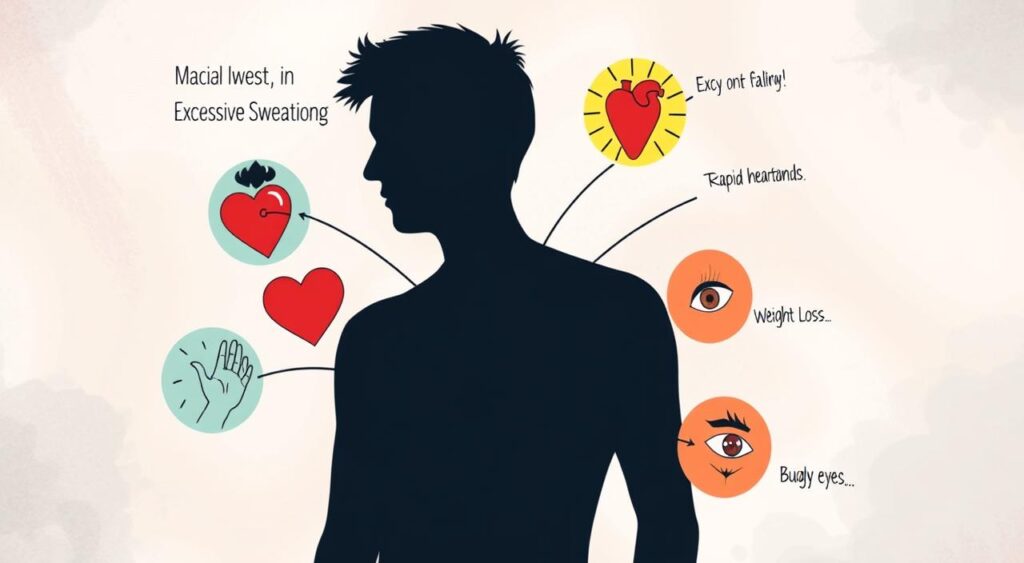Understand and manage thyrotoxicosis, a condition causing an overactive thyroid. Get expert tips to cope with symptoms and improve your health.
Thyrotoxicosis means having too much thyroid hormone in the body. It can be caused by hyperthyroidism or other factors.
Thyrotoxicosis can really affect your health. It can cause weight loss, fast heart rate, mood swings, and trouble handling heat. Knowing the signs is key to getting help fast.

Thyrotoxicosis is more than just a hormonal issue. It needs a full plan for diagnosis, treatment, and care. By learning about thyrotoxicosis and its link to hyperthyroidism, we can see why it’s so important to get the right care.
Key Takeaways
- Thyrotoxicosis affects about 1 in 100 people in the United States.
- It’s often mixed up with hyperthyroidism, but they are different.
- Having too much thyroid hormone can cause symptoms like weight loss and mood swings.
- Seeing a doctor quickly is key to managing and treating thyrotoxicosis.
- Understanding the link between thyrotoxicosis and hyperthyroidism is vital for good care.
- Thyrotoxicosis needs a detailed plan for diagnosis, treatment, and management.
Understanding Thyrotoxicosis and Its Impact on Health
Thyrotoxicosis is when you have too much thyroid hormone in your body. This leads to many symptoms and health problems. It happens when your thyroid hormone levels get out of balance, often due to thyroid issues.
Knowing the difference between thyrotoxicosis and hyperthyroidism is key. Both involve too much thyroid hormone, but they come from different causes. Thyrotoxicosis can be from an overactive thyroid gland or other reasons like inflammation or too much hormone intake.
Definition and Basic Concepts
Thyrotoxicosis means you have too much thyroid hormone, causing symptoms like weight loss and a fast heartbeat. It can be caused by Graves’ disease, thyroid nodules, or thyroiditis. High thyroid hormone levels also lead to TSH suppression, as the body tries to balance it out.
How Thyrotoxicosis Differs from Hyperthyroidism
Thyrotoxicosis and hyperthyroidism both mean too much thyroid hormone. But, hyperthyroidism is when your thyroid gland makes too much. Thyrotoxicosis can come from different sources, like thyroid issues or taking too much hormone. Knowing these differences helps doctors diagnose and treat you right.
Impact on Body Systems
Thyrotoxicosis affects many body systems, like the heart, nerves, and muscles. Too much thyroid hormone can cause a fast heartbeat and high blood pressure. It can also lead to anxiety, muscle weakness, and tremors.
Common Causes and Risk Factors
Thyrotoxicosis can happen for several reasons. Autoimmune diseases like Graves’ disease are common causes. This disease makes the immune system attack the thyroid gland, causing it to make too many hormones. Goiter, or an enlarged thyroid gland, can also lead to thyrotoxicosis.
Here are some common risk factors for thyrotoxicosis:
- Family history of thyroid disease
- Autoimmune disorders, such as Graves’ disease
- Goiter or thyroid nodules
- Exposure to radiation
Knowing the causes and risk factors of thyrotoxicosis is key. It helps in early detection and treatment. Recognizing the signs and symptoms early can prevent serious problems.
Recognizing the Signs and Symptoms
Thyrotoxicosis shows itself in many ways, making it key to know its signs and symptoms. It can impact your body in physical, mental, and emotional ways. A serious problem is a thyroid storm, which needs quick medical help.
Some common symptoms of thyrotoxicosis include:
- Weight loss
- Palpitations
- Increased appetite
- Nervousness and anxiety
Physical Symptoms
Physical symptoms of thyrotoxicosis can be scary. They include feeling too hot, being very tired, and weak muscles. These symptoms can really affect your daily life and health.
Mental and Emotional Changes
Mental and emotional changes can happen too. You might feel mood swings, get easily upset, or feel depressed. It’s important to notice these changes and get medical help if they get worse.
Emergency Warning Signs
In serious cases, thyrotoxicosis can cause a thyroid storm. This is a very dangerous condition. Signs of a thyroid storm include feeling extremely tired, confused, and chest pain. If you see these signs, get medical help right away to avoid serious problems.
| Symptom | Description |
|---|---|
| Weight loss | Unintentional weight loss despite increased appetite |
| Palpitations | Irregular or rapid heartbeat |
| Thyroid storm | A life-threatening condition requiring immediate medical attention |
The Diagnostic Process for Thyrotoxicosis
The process to diagnose thyrotoxicosis includes thyroid function tests. These tests are key to finding the cause and guiding treatment. They measure thyroid-stimulating hormone (TSH), triiodothyronine (T3), and thyroxine (T4) levels in the blood.
To diagnose thyrotoxicosis, doctors look at symptoms, medical history, and lab results. Thyroid function tests check thyroid hormone levels. They help find if the thyroid gland is working too much or too little. Sometimes, a thyroid scan or ultrasound is needed to see the gland and nearby tissues.
- Medical history: Doctors take a detailed medical history to find any underlying conditions.
- Physical examination: A physical exam checks for signs like weight loss, tremors, and bulging eyes.
- Thyroid function tests: These tests measure thyroid hormone levels to see if the gland is overactive or underactive.
| Test | Description |
|---|---|
| TSH | Measures the level of thyroid-stimulating hormone in the blood |
| T3 | Measures the level of triiodothyronine in the blood |
| T4 | Measures the level of thyroxine in the blood |
Understanding Thyroid Function Tests
Thyroid function tests are key in spotting and handling thyrotoxicosis. They check the blood for hormone levels, like tsh levels, to see if the thyroid gland works right. The main aim is to see if thyroid hormones are balanced in the body.
Measuring tsh levels is a big part of these tests. It shows if the thyroid gland makes too much or too little hormone. Also, checking t3 and t4 measurements gives clues about these hormone levels in the blood.
TSH Levels
TSH levels help figure out if the thyroid gland is working okay. If tsh levels are off, it might mean thyrotoxicosis or another thyroid issue.
T3 and T4 Measurements
T3 and t4 measurements tell us about these hormones in the blood. They help spot and keep an eye on thyrotoxicosis and other thyroid problems.
| Test | Description |
|---|---|
| TSH levels | Measures the level of thyroid-stimulating hormone in the blood |
| T3 measurements | Measures the level of triiodothyronine in the blood |
| T4 measurements | Measures the level of thyroxine in the blood |
Treatment Options and Medical Management
Managing thyrotoxicosis involves several treatment options. The aim of medical management is to lower thyroid hormone production and ease symptoms. Treatments include medication, radioactive iodine therapy, and surgery.
Some common treatments for thyrotoxicosis are:
- Medication to reduce thyroid hormone production
- Radioactive iodine therapy to destroy part of the thyroid gland
- Surgery to remove part or all of the thyroid gland
It’s crucial to consult with a healthcare provider to find the right medical management for thyrotoxicosis. They will assess the pros and cons of each treatment option. Then, they’ll create a plan tailored to your needs.

Understanding the treatment options and getting help from a healthcare provider can help manage thyrotoxicosis. This approach can significantly improve your health.
Medication and Therapeutic Approaches
Thyrotoxicosis treatment often uses a mix of medicines and methods. The main goal is to lower thyroid hormone production and ease symptoms. Anti-thyroid drugs, like methimazole, are key in treating this condition. They block thyroid hormone production.
Beta blockers might be given to control symptoms like a fast heart rate and shaking. Drugs like propranolol can lessen these symptoms. But they don’t change how much thyroid hormone is made.
Treatment Options
- Anti-thyroid medications: methimazole, propylthiouracil
- Beta blockers: propranolol, atenolol
- Radioactive iodine therapy: a permanent treatment option that destroys part of the thyroid gland
Radioactive iodine therapy is a long-term solution. It involves taking a radioactive iodine capsule or liquid. This treatment kills part of the thyroid gland, cutting down hormone production. It’s used for big goiters or when other treatments don’t work.
It’s crucial to work with a healthcare provider to find the best treatment for thyrotoxicosis. The right mix of medicines and treatments can help manage symptoms and improve life quality.
| Treatment Option | How it Works | Potential Side Effects |
|---|---|---|
| Anti-thyroid medications | Inhibit thyroid hormone production | Rash, itching, liver damage |
| Beta blockers | Reduce physical symptoms | Dizziness, fatigue, shortness of breath |
| Radioactive iodine therapy | Destroys part of the thyroid gland | Neck pain, swelling, thyroid storm |
Living with Thyrotoxicosis: Lifestyle Modifications
Managing thyrotoxicosis needs a full approach that includes lifestyle modifications. These changes can ease symptoms and boost well-being. By adding healthy habits to daily life, those with thyrotoxicosis can manage their condition better.
Important lifestyle modifications include managing stress, exercising regularly, and getting enough sleep. These steps help keep the body’s systems in balance and lower the risk of problems. For instance, stress-reducing activities like meditation and yoga can ease anxiety and help relax.
Also, eating a balanced diet and staying active can help keep a healthy weight and improve health. Here are some tips for healthy lifestyle modifications:
- Do regular physical activities, like walking or swimming
- Try stress management, such as meditation or deep breathing
- Ensure you sleep well each night, aiming for 7-8 hours
By adopting these lifestyle modifications, people with thyrotoxicosis can take charge of their health and enhance their life quality. It’s crucial to work with a healthcare provider to create a plan that fits individual needs and promotes well-being.
Diet and Nutrition Guidelines
Managing thyrotoxicosis needs a balanced diet and good nutrition. A well-planned diet can ease symptoms and boost health. It’s key to eat foods rich in vitamins and minerals.
A healthy diet for thyrotoxicosis includes foods like omega-3 fatty acids found in salmon and sardines. These help reduce inflammation. Also, eat fresh fruits, vegetables, whole grains, and lean proteins. Make sure to get enough iodine, a mineral important for thyroid function.
Foods to Include
- Fatty fish, such as salmon and sardines
- Fresh fruits, including berries and citrus fruits
- Leafy green vegetables, such as spinach and kale
- Whole grains, including brown rice and quinoa
Supplement Recommendations
Some supplements can also support thyroid health. Selenium and zinc supplements can reduce inflammation and boost the immune system. But, always talk to a healthcare professional before taking any supplements.

A well-planned diet and good nutrition are key for managing thyrotoxicosis. Eating whole, nutrient-rich foods and using supplements can help. Always get personalized diet advice from a healthcare professional.
| Foods | Nutritional Benefits |
|---|---|
| Fatty fish | Rich in omega-3 fatty acids, which reduce inflammation |
| Fresh fruits and vegetables | High in antioxidants and fiber, which support overall health |
| Whole grains | Rich in fiber, vitamins, and minerals, which support digestive health |
Managing Complications and Associated Conditions
Thyrotoxicosis can cause serious complications if not treated right. These can include heart issues like atrial fibrillation and osteoporosis. It’s key to know these risks and take steps to avoid or manage them.
Regular health checks and sticking to treatment plans are vital. People with thyrotoxicosis need to work closely with their doctors. This helps monitor their condition and handle any complications that come up. Changes in diet and stress management, along with medication, can help.
Some common complications and associated conditions of thyrotoxicosis include:
- Heart problems, such as atrial fibrillation and congestive heart failure
- Osteoporosis and bone fractures
- Muscle weakness and wasting
- Eye problems, such as exophthalmos and vision loss
Knowing about the complications and associated conditions of thyrotoxicosis helps patients take action. With the right treatment and care, managing thyrotoxicosis is possible. This reduces the risk of serious problems.
| Complication | Description |
|---|---|
| Heart problems | Atrial fibrillation, congestive heart failure |
| Osteoporosis | Bone fractures, osteopenia |
| Muscle weakness | Muscle wasting, myopathy |
Prevention Strategies and Long-term Outlook
People with thyrotoxicosis can lower their risk of problems by using prevention strategies. These include eating well, exercising regularly, and catching the condition early. This helps improve their life quality.
The outlook for those with thyrotoxicosis is usually good. This is true if they get the right treatment and care. By following their doctor’s advice and making smart health choices, they can avoid serious issues. This way, they can stay healthy overall.
Some important prevention strategies for thyrotoxicosis are:
- Regular visits to a healthcare provider
- Keeping an eye on thyroid hormone levels
- Eating right and staying active
- Handling stress and sleeping well
By being proactive about their health and teaming up with their doctor, people with thyrotoxicosis can look forward to a bright future. They can also greatly enhance their well-being.
| Prevention Strategy | Description |
|---|---|
| Regular Check-ups | Regular visits to a healthcare provider help keep an eye on thyroid hormone levels. They also catch any problems early. |
| Diet and Exercise | Eating well and exercising regularly can help manage symptoms. It also boosts overall health. |
| Stress Management | Managing stress and getting enough sleep can lower the risk of complications. It also improves overall well-being. |
Conclusion: Taking Control of Your Thyroid Health
Managing thyrotoxicosis needs a proactive and detailed approach. By understanding the condition and its symptoms, you can manage your thyroid health. This improves your overall well-being.
Early diagnosis and proper treatment are crucial. Keep an eye on your thyroid function and follow your treatment plan. Also, make lifestyle changes like eating well and exercising regularly.
With the knowledge from this article, you can manage your thyroid health better. Work with your medical team and make choices that support your long-term health. This way, you can live a healthier and more fulfilling life.
FAQ
Q: What is thyrotoxicosis?
A: Thyrotoxicosis is when your thyroid gland makes too much hormone. This makes your thyroid work too hard. Symptoms include losing weight, a fast heartbeat, feeling anxious, and weak muscles.
Q: How does thyrotoxicosis differ from hyperthyroidism?
A: Thyrotoxicosis means you have too much thyroid hormone in your body. It can happen for many reasons. Hyperthyroidism is when your thyroid gland makes too much hormone because it’s overactive.
Q: What are the common causes of thyrotoxicosis?
A: Graves’ disease is the main cause of thyrotoxicosis. It’s an autoimmune disorder that makes too much thyroid hormone. Other causes include thyroid nodules, thyroiditis, and taking too much thyroid hormone medicine.
Q: What are the signs and symptoms of thyrotoxicosis?
A: Signs include losing weight, eating more, and a fast or irregular heartbeat. You might also feel shaky, anxious, sweaty, and weak. A severe case can lead to thyroid storm, which is very dangerous.
Q: How is thyrotoxicosis diagnosed?
A: Doctors use a physical exam, your medical history, and lab tests to diagnose it. They check your thyroid-stimulating hormone (TSH) levels and free thyroxine (T4) and triiodothyronine (T3) levels.
Q: What are the treatment options for thyrotoxicosis?
A: Treatment can include medicines, radioactive iodine, or surgery. The best option depends on why you have it and how severe it is.
Q: What lifestyle modifications can help manage thyrotoxicosis?
A: Managing it means managing stress, exercising regularly, eating well, and sleeping enough. You should also avoid certain foods and supplements.
Q: Can thyrotoxicosis lead to complications?
A: Yes, it can cause heart problems, osteoporosis, and eye issues if not treated. Regular check-ups and following your treatment plan are key to avoiding these problems.
Q: What is the long-term outlook for individuals with thyrotoxicosis?
A: With the right treatment and care, most people with thyrotoxicosis do well. Early treatment and sticking to your treatment plan can prevent serious problems and improve your life quality.
